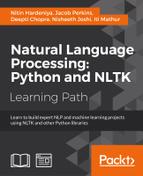Chunking is shallow parsing where instead of reaching out to the deep structure of the sentence, we try to club some chunks of the sentences that constitute some meaning.
A chunk can be defined as the minimal unit that can be processed. So, for example, the sentence "the President speaks about the health care reforms" can be broken into two chunks, one is "the President", which is noun dominated, and hence is called a noun phrase (NP). The remaining part of the sentence is dominated by a verb, hence it is called a verb phrase (VP). If you see, there is one more sub-chunk in the part "speaks about the health care reforms". Here, one more NP exists that can be broken down again in "speaks about" and "health care reforms", as shown in the following figure:

This is how we broke the sentence into parts and that's what we call chunking. Formally, chunking can also be described as a processing interface to identify non-overlapping groups in unrestricted text.
Now, we understand the difference between shallow and deep parsing. When we reach the syntactic structure of the sentences with the help of CFG and understand the syntactic structure of the sentence. Some cases we need to go for semantic parsing to understand the meaning of the sentence. On the other hand, there are cases where, we don't need analysis this deep. Let's say, from a large portion of unstructured text, we just want to extract the key phrases, named entities, or specific patterns of the entities. For this, we will go for shallow parsing instead of deep parsing because deep parsing involves processing the sentence against all the grammar rules and also the generation of a variety of syntactic tree till the parser generates the best tree by using the process of backtracking and reiterating. This entire process is time consuming and cumbersome and, even after all the processing, you might not get the right parse tree. Shallow parsing guarantees the shallow parse structure in terms of chunks which is relatively faster.
So, let's write some code snippets to do some basic chunking:
# Chunking >>>from nltk.chunk.regexp import * >>>test_sent="The prime minister announced he had asked the chief government whip, Philip Ruddock, to call a special party room meeting for 9am on Monday to consider the spill motion." >>>test_sent_pos=nltk.pos_tag(nltk.word_tokenize(test_sent)) >>>rule_vp = ChunkRule(r'(<VB.*>)?(<VB.*>)+(<PRP>)?', 'Chunk VPs') >>>parser_vp = RegexpChunkParser([rule_vp],chunk_label='VP') >>>print parser_vp.parse(test_sent_pos) >>>rule_np = ChunkRule(r'(<DT>?<RB>?)?<JJ|CD>*(<JJ|CD><,>)*(<NN.*>)+', 'Chunk NPs') >>>parser_np = RegexpChunkParser([rule_np],chunk_label="NP") >>>print parser_np.parse(test_sent_pos) (S The/DT prime/JJ minister/NN (VP announced/VBD he/PRP) (VP had/VBD asked/VBN) the/DT chief/NN government/NN whip/NN …. …. …. (VP consider/VB) the/DT spill/NN motion/NN ./.) (S (NP The/DT prime/JJ minister/NN) # 1st noun phrase announced/VBD he/PRP had/VBD asked/VBN (NP the/DT chief/NN government/NN whip/NN) # 2nd noun phrase ,/, (NP Philip/NNP Ruddock/NNP) ,/, to/TO call/VB (NP a/DT special/JJ party/NN room/NN meeting/NN) # 3rd noun phrase for/IN 9am/CD on/IN (NP Monday/NNP) # 4th noun phrase to/TO consider/VB (NP the/DT spill/NN motion/NN) # 5th noun phrase ./.)
The preceding code is good enough to do some basic chunking of verb and noun phrases. A conventional pipeline in chunking is to tokenize the POS tag and the input string before they are ed to any chunker. Here, we use a regular chunker, as rule NP / VP defines different POS patterns that can be called a verb/noun phrase. For example, the NP rule defines anything that starts with the determiner and then there is a combination of an adverb, adjective, or cardinals that can be chunked in to a noun phrase. Regular expression-based chunkers rely on chunk rules defined manually to chunk the string. So, if we are able to write a universal rule that can incorporate most of the noun phrase patterns, we can use regex chunkers. Unfortunately, it's hard to come up with those kind of generic rules; the other approach is to use a machine learning way of doing chunking. We briefly touched upon ne_chunk() and the Stanford NER tagger that both use a pre-trained model to tag noun phrases.
